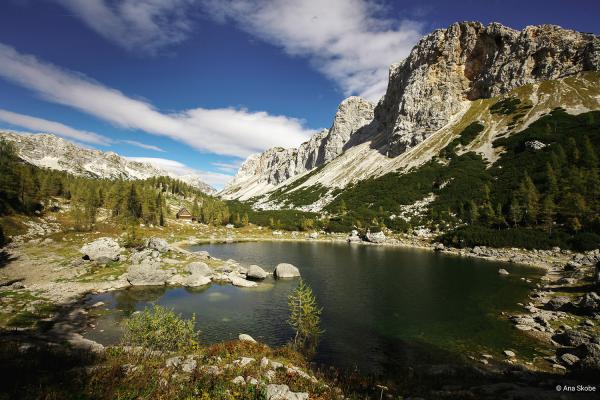Alenka Smerkolj
Secretary General of the Alpine Convention

Celebrating 40 years of nature protection and conservation in the Triglav National Park
From the peak of Triglav at 2.864m all the way down to 180m above sea level in the Tolminka Gorge, the Triglav National Park is a place of natural beauty and rich cultural heritage. As it celebrates its 40th anniversary this year, the Park’s role in protecting the natural and cultural heritages of the Alps has never been more important.
Much can change over 40 years, and this anniversary is a tribute to the invaluable role the Triglav national park plays in the Alpine region, both for nature as well as for its visitors and inhabitants. The Triglav National Park, as Slovenia’s only national park and one of Europe’s oldest, contributes to protecting many of the beautiful yet vulnerable natural treasures of the Alps.
The challenges of the past year and a half have once again shown that we must look after nature and stay within its boundaries. We need to work harder to secure a more sustainable relationship with nature and the living world around us. In the Alps, the establishment of national parks has played and continues to play an important role here.
National parks are areas of natural beauty and cultural significance. They draw people from all around to come and enjoy their landscapes, flora, and fauna. National parks are also a source of knowledge and learning. Their success relies on the people who work there and dedicate their time to informing, educating, and inspiring visitors and inhabitants alike. The work done every day in the Alpine national parks contributes to the implementation of the Alpine Convention, the first international treaty aimed at the sustainable development and protection of an entire mountain range.

Photo: Ana Skobe
The Convention’s Contracting Parties – the eight Alpine countries and the European Union – commit to “take adequate measures to establish a network of existing national and transboundary protected areas, of biotopes and other protected elements or those to be protected.”
The areas of the Alpine national parks clearly demonstrate that nature does not stop at nor adhere to national boundaries. Many of the national parks in the Alps cross one, two or even more borders, illustrating the value and necessity of cross-border cooperation to protect our common natural heritage.
To achieve this objective, the Alpine Convention works with many partners at different levels across the Alps – including with the Triglav National Park through its membership of the Alpine Network of Protected Areas (ALPARC), one of the Convention’s Observer organisations.
Transnational organisations like ALPARC facilitate the sharing of expertise and experience between the managers of Alpine protected areas. The cross-border network also enables cooperation across the borders between the parks to jointly pursue a sustainable development of the Alps.
In 2021, as Triglav celebrates its 40th anniversary, the Alpine Convention will be celebrating its own anniversary, having entered into force 30 years ago. In this year of celebrations, let us enjoy the wonders of nature and reassert our commitments to protect the Alps and all the biodiversity, natural resources, and rich cultural heritages they hold.
Safeguarding the Alps is our common duty as the Alpine Convention, the national parks, inhabitants, visitors, and decision-makers – now and for the future.
